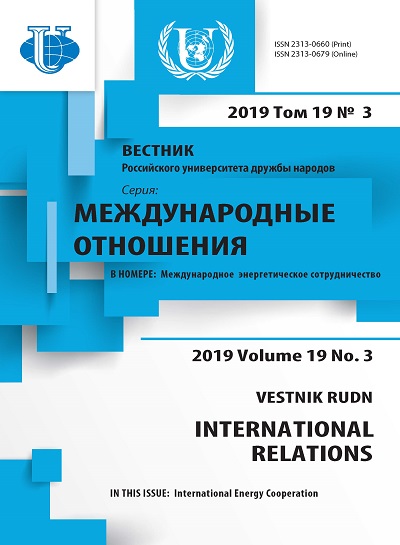Al-Azhar University in the Events of the Arab Spring (Case of Egypt)
- Authors: Lashkhia Y.V.1
-
Affiliations:
- RUDN University
- Issue: Vol 19, No 4 (2019): Islamic Factor in World Politics
- Pages: 583-596
- Section: THEMATIC DOSSIER
- URL: https://journals.rudn.ru/international-relations/article/view/22837
- DOI: https://doi.org/10.22363/2313-0660-2019-19-4-583-596
- ID: 22837
Cite item
Full Text
Abstract
Due to the comprehensiveness of Islam, the role of the “Islamic factor” in political processes in the Middle East and North Africa is great, while the nature of the manifestations of the “Islamic factor” largely depends among other things on the current state of modern religious educational institutions, including those serving as a forge of Islamic personnel today. One of the most prestigious universities in Islamic oikumene, giving religious education for Muslims from all over the world, is AlAzhar al-Sharif (the shorter Al-Azhar is more common). It was here that some famous thinkers studied, who further significantly contributed to the development of the so-called “political Islam”. This study is an attempt to clarify the role of Al-Azhar University and related Islamic scholars in the socio-political processes of the Middle East and North Africa. Conducting the research, the author largely turned to the sources of the Islamic religion (the Qur’an, Hadith), theological texts of a number of thinkers (for example, the interpretation of the Qur’an Rashid Rida), religious polemical works (the work of Sheikh Osama al-Azhari against the “Muslim Brotherhood” and other “Islamist” trends), documents compiled by the leadership of Al-Azhar; academic literature on related issues. The author came to the conclusion that the “Islamic factor” did not play a crucial role at the beginning of events, but vividly manifested itself subsequently. The actual suppression of Islam by secular dictators created a fertile ground for the acute discontent of believing citizens and activists of various movements who uphold a particular version of the Islamic political alternative. The most influential university in the Islamic world, Al-Azhar, in an official document, “Arab Spring”, indicated the possibility of a shift in despotic power, while emphasizing at the same time the inadmissibility of violent suppression of peaceful protest. Certain Azharite theologians were directly involved in the events of the “Arab Spring”, in particular, the passionate scholar Yusuf al-Qaradawi, associated with the Muslim Brotherhood movement and graduated from Al-Azhar, as well as Sheikh Emad Effat, who died during the suppression of an unarmed speech 15 December 2011. Such activity of various Islamic forces in the political sphere is primarily due to the very nature of the Islamic tradition, which does not separate the “sacred” and “profane”.
Keywords
About the authors
Yurii Vitalevich Lashkhia
RUDN University
Author for correspondence.
Email: george-leo@mail.ru
postgraduate student, the Department of Theory and History of International Relations
Moscow, Russian FederationReferences
- Al-Awadi, H. (2004). In Pursuit of Legitimacy: the Muslim Brothers and Mubarak, 1982—2000. London; NY: Tauris Academic Studies.
- Alianak, S. (2007). Middle Eastern Leaders and Islam: A Precarious Equilibrium. NY: Peter Lang.
- Baets, A. (2002). Censorship of Historical Thought: A World Guide, 1945—2000. Greenwood Publishing Group.
- Bano, M. (2018). At the Tipping Point? Al-Azhar’s Growing Crisis of Moral Authority. International Journal of Middle East Studies, 50 (4), 715—734. doi: 10.1017/S0020743818000867
- Brilyov, D.V. (2015). The Politisation of Sufism in the Context of the “Arab Spring”. In: Knysh, A., Brilyov, D. & Yarosh O. (Eds.). Sufism and Muslim Spiritual Tradition: Texts, Institutions, Ideas and Interpretations. Saint Petersburg: Petersburg Oriental Studies publ. (In Russian).
- El-Gamal, M. (2006). Islamic Finance: Law, Economics and Practice. Cambridge: Cambridge University Press.
- Gesink, I. (2014). Islamic Reform and Conservatism: al-Azhar and the Evolution of Modern Sunni Islam. London: IB Tauris.
- Hellyer, H.A. & Brown, N.J. Leading From Everywhere. The History of Centralized Islamic Religious Authority. Foreign Affairs. June 15. URL: https://www.foreignaffairs.com/articles/2015-06-15/leading-everywhere (accessed: 06.09.2019).
- Hirschl, R. (2010). Constitutional Theocracy. Harvard University Press.
- Ismail, S. (2006). Rethinking Islamist Politics: Culture, the State and Islamism. London: I.B. Tauris.
- Jacquemond, R. (2008). Conscience of the Nation: Writers, State and Society in Modern Egypt. Cairo: The American University on Cairo.
- Kienle, E. (2001). A Grand Delusion: Democracy and Economic Reform in Egypt. London: I.B. Tauris.
- Sharipova, R.M. (1972). The Role of Al-Azhar University in the Socio-Political and Ideological Life of the Oar (AR) at the Present Stage [PhD thesis]. Moscow. (In Russian).
- Skovgaard-Petersen, J. (1997). Defining Islam for the Egyptian State: Muftis and Fatwas of the Dar al-Ifta. Brill Academic Publishers.
- Syukiyainen, L.R. (2013). “Arab Spring” and Islamic Legal Thought. Law. Journal of the Higher School of Economics, 1, 16—37. (In Russian).
- Syukiyainen, L.R. (2016). The Islamic Concept of the Caliphate: The Original Beginnings and Modern Interpretation. Islam in the Modern World, 3, 139—154. (In Russian).
- Tsaregorodtseva, I.A. (2012). Al-Azhar and State Power in Egypt: Development of Relations in the Second Half of 20th— 21st Centuries. Pax Islamica, 1—2 (8—9), 480—491. (In Russian).
- Warren, D. (2014). The ‘Ulama’ and the Arab Uprisings 2011—13: Considering Yusuf al-Qaradawi, the ‘Global Mufti,’ between the Muslim Brotherhood, the Islamic Legal Tradition, and Qatari Foreign Policy. New Middle Eastern Studies, 4, 1—32. doi: 10.29311/nmes.v4i0.2649
- Zeghal, M. (1999). Religion and Politics in Egypt: The Ulema of Al-Azhar, Radical Islam, and the State (1952—94). Cambridge University Press.
- Zelenev, E.I. (2015). Fitnah Like a Form and Method of the Political Protest in the Arab Countries. In:Vassiliev, A.M. (Eds.). The Arab Crisis: Threats of the Great War. Moscow: LENAND publ. (In Russian).
Supplementary files










